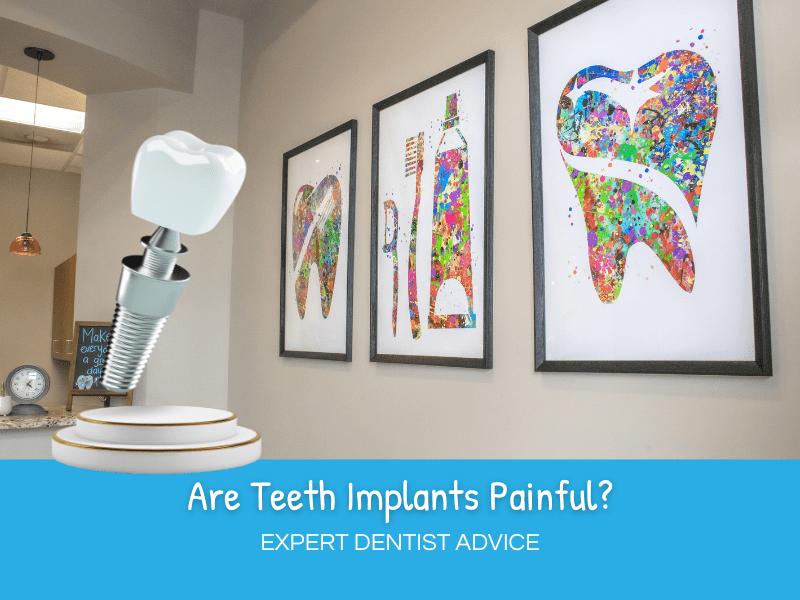Are Teeth Implants Painful? Expert Dentist Advice
- Dr. Nick Nguyen (WIN), D.D.S

- Feb 14, 2025
- 4 min read
Updated: Oct 8, 2025
“Are Teeth Implants Painful?” — Dr. Nick Answers
If you're thinking about replacing a missing tooth, your first question is probably: “Are teeth implants painful?”
It’s one of the most common questions we hear at Traditions Dental—and it’s a fair one. The idea of oral surgery can sound intimidating. But the truth? Most patients are surprised by how little discomfort they actually feel.
Dental implants are a trusted, long-lasting solution for missing teeth. And thanks to modern techniques and gentle care, getting one is more comfortable than you might expect. As your local implant dentist in Hoschton, I’m here to walk you through what to expect—and how we make the experience as easy as possible.

Q: Dr. Nick, how painful is a dental implant procedure?
A: The short answer: not very. Thanks to local anesthesia (and sedation if needed), you shouldn’t feel pain during the surgery. Most discomfort comes afterward—mild soreness, swelling, or tenderness. That’s usually well managed with over-the-counter pain relievers.
Q: What determines how much discomfort I’ll feel?
A: Several factors influence it:
Procedure complexity — If bone grafts or sinus lifts are needed, those add more steps, meaning more post-op soreness.
Your pain tolerance — Everyone’s threshold is different.
Anesthesia choice — Local anesthesia is standard, but for anxious patients, we can offer sedation.
Post-op care — Following instructions (ice packs, soft diet, avoiding strain) helps significantly reduce discomfort.

Q: What’s the most painful part of the process?
A: For many, the gum incision and suturing—the soft-tissue work—is the most noticeable. But it’s usually just tender, not sharp pain. The implant screw going into bone is often described as pressure or vibration rather than pain, since bone itself doesn’t have pain nerves.
Q: How long does the pain last?
A: Typically, the worst of it is in the first 1–3 days. By days 4–7, soreness declines sharply. By two weeks, most patients feel pretty much back to normal. Some residual sensitivity—especially in humid or damp weather—isn’t unheard of, but that’s mild.
Q: Are dental implants really worth it despite possible discomfort?
A: Absolutely. Implants are considered the gold standard for replacing missing teeth. They:
Preserve jawbone health
Restore full chewing and speaking ability
Look and feel natural
Can last decades with good care
Many patients tell me they’d gladly tolerate a few days of soreness for the long-term benefits.

Understanding the Basics (Quick Overview)
What are dental implants? Artificial root posts (usually titanium) surgically placed into the jawbone. Over time, they fuse with bone (osseointegration). A connector (abutment) and crown finish the restoration.
Types of implants: The most common are endosteal (placed in bone). In rare cases with insufficient bone, we may consider subperiosteal or mini implants.
Typical timeline: 1. Consultation & imaging 2. Implant placement 3. Healing/osseointegration (weeks to months) 4. Abutment + crown placement
How We Manage Pain at Traditions Dental
Local anesthesia + optional sedation — You’ll be asleep to pain, not to treatment.
Gentle surgical technique — Minimally invasive where possible to reduce trauma.
Clear aftercare instructions — Ice packs, soft foods, no heavy chewing, good oral hygiene.
Pain relief protocol — Over-the-counter meds usually suffice. If needed, we’ll prescribe stronger options.

Final Thoughts
Dental implants aren’t completely pain-free—but for most patients, the discomfort is mild, short-lived, and very manageable. Thanks to modern techniques and effective anesthesia, the experience is often easier than expected—with many patients comparing it to less discomfort than a tooth extraction.
If you’re in Hoschton, Braselton, or the surrounding area and you’re considering dental implants, we’re here to guide you every step of the way. At Traditions Dental, our goal is to help you feel informed, comfortable, and confident in your decision.
Dental implants offer a safe, lasting solution for missing teeth—restoring both function and appearance. The long-term benefits—from healthier bone structure to a confident smile—far outweigh any brief recovery discomfort.
Let’s talk about whether dental implants are right for you—and how we can make your experience as smooth and stress-free as possible.
For more tips consider checking out our extensive library of resources about dental implants including:
Frequently Asked Questions About Dental Implants
Q: How painful is a tooth implant?
A: Tooth implants are not typically painful during the procedure due to local anesthesia. Most patients experience minimal discomfort that's easily managed with over-the-counter pain medication for 2-3 days following surgery.
Q: Is a dental implant worth it?
A: Yes, dental implants are considered the gold standard for tooth replacement. They provide permanent, natural-looking results that preserve jawbone health, restore full chewing function, and can last a lifetime with proper care.
Q: What is the downside to dental implants?
A: The main downsides include higher upfront cost compared to other options, longer treatment timeline (3-6 months for healing), and the need for minor surgery. However, most patients find the long-term benefits outweigh these temporary considerations.
Q: What is the pain scale for dental implants?
A: Most patients rate dental implant discomfort as 3-4 out of 10 on the pain scale. The procedure itself is typically painless with anesthesia, and post-operative discomfort is generally less than a tooth extraction and resolves within a few days.
Q: How much do dental implants cost?
A: Dental implant costs typically range from $2,500 to $4,000 per tooth, including the implant, abutment, and crown. Factors affecting price include implant complexity, location, and additional procedures needed. At Traditions Dental, complete dental implants (implant + abutment + crown) are priced from $2,499 to $2,899 depending on complexity. Many dental practices offer financing options and payment plans to make treatment more affordable.
For those considering dental implants, it's crucial to consult with a qualified implant dentist to discuss your individual case and address any concerns. Proper care and regular check-ups are essential to ensure the longevity and comfort of your dental implants. To learn more about Traditions Dental, visit our About Us page, and for additional tips and information, follow us on Instagram @traditionsdental and Facebook @traditionsdental. With the right care and attention, dental implants can provide a lifetime of confident smiles and improved oral health.
.png)





Comments